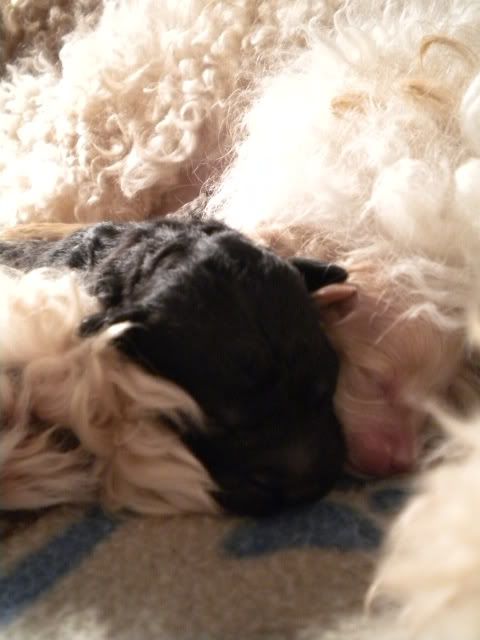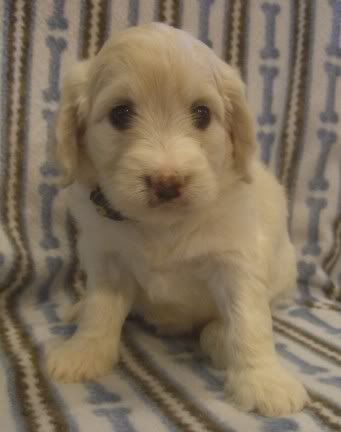Labradoodle & Goldendoodle Forum
I noticedin the past month or so that Tuckers nose (so cute) is turning brownish right in the middle. It use to be so so black and cute. Is this normal? He is cream GD.
Replies to This Discussion
-
LOL, honest to goodness, I looked at those pups and thought, "Oh look someone else has two merles in their litter!" THEN I read what you wrote. I think the lack of sleep is getting to me! I've been on an air mattress in the nursery all week.....
Here is the solid black pup. Her nose is black too.

Plastic food/water bows can also cause a dogs black nose to fade or lighten.
-
BTW, the apricot pups noses' will turn black in a few days. They are already spotting black now.
-
April, why are some born with the nose already black, and some take a few days? And can you tell at birth if the light ones will stay light?
-
I'm happy to share what I know, but by no means am I am expert and I'm sure other breeders know more....hopefully they will chime in.
I know that THESE pups (above) noses will all darken because neither of the parents carry for chocolate. If the parents did carry chocolate then some would have liver (brown) noses.
Blue is a dilute black, which is why the blue pups are born with dark noses. My apricot pups, and I can only speak for myself, are always born with a pink nose and it darkens.
Now I'll really muddy the water... Earlier this year I had a parti factored litter and had a couple pups with a "parti nose."
I kept back this pup. She's 6 months now and her nose still isn't all black. I'm not sure it ever will be.

-
I think, at least for me, the question is not about the color genetics, which I think I get in so far as it's known, after doing some reading on this, especially on the Tallai site. My main questions is about the development of the pigment over time in some of the pups. It's peculiar that the blacks seem to have black noses at the start but the lighter pups, whether they are going to have black or rose pigment, take time to fully develop it. What color are the paw pads of the apricots and reds at birth? Are the darker than the caramels even then?
-
-
How does the plastic bowl cause his, do you know?
-
Honestly, I don't. I've read it so many times though. I just did a search on it but what I found didn't make sense... I'll look more tomorrow. I need to get some sleep. It's late for us EST-ers. :o)
-
Yes, I know I'm one also but luckily no puppy nursery duties for me. Your pups are beautiful and you are always so helpful. Thanks.
-
Here's a page with several answer related to various causes of nose depigmentation. The plastic connection sounds like an allergic response.
http://www.vetinfo.com/ddepigmt.html
-
That was a good link. This part is particularly relevent to this discussion, because it addresses Labs & Goldens:
"The various causes of loss of pigmentation of the nasal planum (the usually black portion of the nose) that I can find good references for are:
1) Dudley nose -- loss of pigment seen in a number of breeds for unknown reasons in which the nose is black when dogs are young but fades to brown or sometimes even white as the dog ages.
2) A transient form of the above condition may exist or it may be something else, but some dogs do lose some pigment and then recover the normal coloring of their nose over time.
3) Labradors, Golden retrievers, Bernese Mountain dogs and Siberian huskies may have seasonal variation in the color of the nasal planum, usually lighter in the winter and darker in the summer. The cause of this is not known, either. Some vets refer to this as "snow nose".
4) Vitiligo can cause loss of pigment of the nose and it may also be part of a syndrome of immune mediated disease in which hypothyroidism also occurs, so perhaps this is the link to loss of color of the nose and hypothyroidism but if it is, the hypothyroidism is thought to occur after another disorder causes the color change. Dogs with vitiligo normally have development of patches of white hair or white hairs scattered in the hair coat. I don't think that loss of pigment in the nasal planum only is likely with this condition.
5) Contact dermatitis can cause loss of pigment in the nose -- some dogs are reported to be sensitive to the plastic that is found in some feeding bowls, for instance. Continual irritation of the nasal planum from a cause like this might lead to loss of pigment. Usually the lips are also are inflamed or may have pigment loss if they are dark, too."
The dermatitis part seems to involve the lips, too, if that's the cause. It seems like for most of us whose dogs have this color loss, the first 3 explanations are most likely. At least, I hope so. -
-
Found this on-line:
"What makes a dog’s nose change colour?
A variety of things can cause colour change in your dog’s nose. Obviously, the sunburn mentioned above can cause redness in a normally light-coloured nose. Dogs with pale or sensitive noses will often have some minor colour change with the change in the seasons – just as with people who tan. Another common cause of colour change occurs in dogs that eat out of plastic dishes. This is called contact sensitivity, and can be avoided by using glass, ceramic, or stainless steel food and water bowls. These materials are also less likely to harbour bacteria."
But I also remember a recent discussion here about plastic bowls harboring bacteria because of tiny scratches; I'm sure you participated in that one, you might remember it.
-
I do but i still wonder about the contact sensitivity.
© 2024 Created by Adina P.
Powered by
![]()